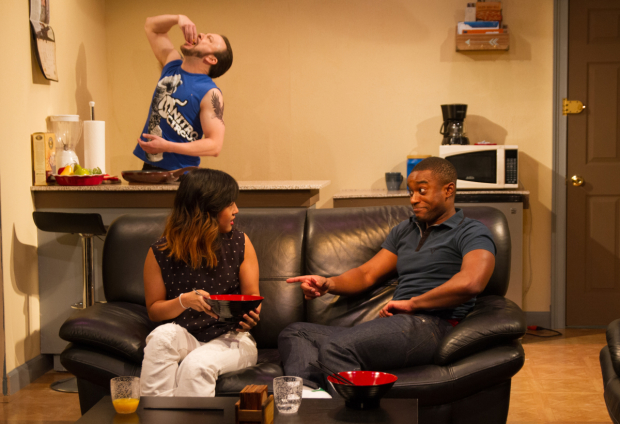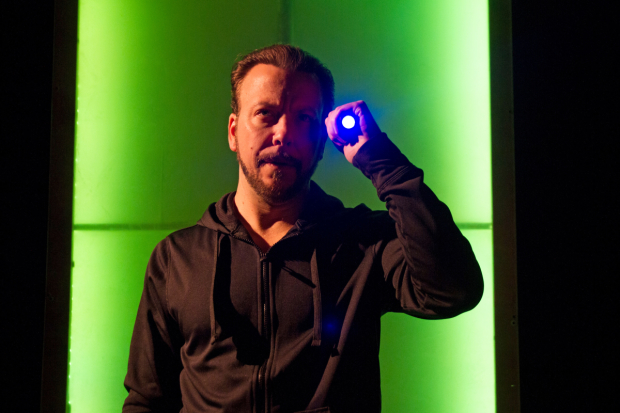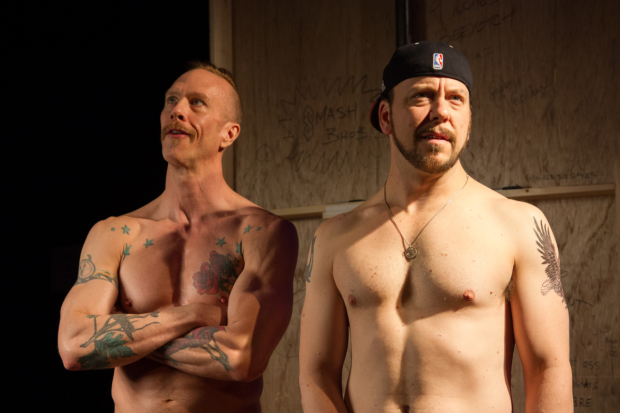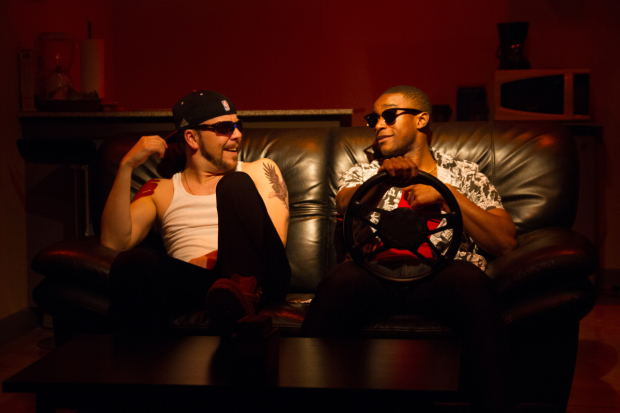Mope
Paul Cameron Hardy’s new play explains the current state of the world through the lens of pornography.

(© Jody Christopherson)
Is pornography art? Certainly, the process of shooting commercial porn — lights, camera, action — bears a striking resemblance to that of more "legitimate" film. The makeup and stage effects used in porn have also been rightly compared to kabuki: No one ever looks that perfect during coitus. So if life imitates art, does it also attempt to imitate the impossible erotic dreams concocted in porn? This is just one of many questions at the heart of Mope, Paul Cameron Hardy's devastatingly relevant new play at Ensemble Studio Theatre.
"Mope" is industry lingo for the lowest male on the adult film totem pole. These are men brought into a scene as nothing more than a spare phallus. Trevor (Eric T. Miller) and Shawn (R.J. Brown) are mopes. They're also best bros and roommates living in California's San Fernando Valley. But when Shawn (who is black and considerably more endowed) is promoted to being an actual performer, Trevor wonders why.

(© Jody Christopherson)
We get a clue about the source of his career stagnation when he interacts with his new neighbor, Alice (Jennifer Tsay): Within minutes of meeting her, he states that she can get any man she wants because she is mysterious and Asian. It seems like Trevor mostly engages with race in the form of an internet checkbox. When he later bluntly suggests a ménage a trois, we understand the full depth of his lack of finesse. He is no more chivalrous with his coworkers, like Piper Moore (a bitingly funny Hollye Hudson), who prefers European men. They all dread working with "King Mope," who has a tendency to pull hair and never make eye contact. But Trevor believes Shawn is leapfrogging him because black performers with big packages are unfairly favored by the industry.
Hardy brilliantly distills giant themes of toxic masculinity and waning privilege into the microcosm of porn: We watch Trevor desperately try to hold on to his virility in a world that increasingly finds him repugnant. Hardy doesn't soft-pedal Trevor's awfulness, but he never allows us to lose sight of his humanity.
Director R.J. Tolan brutally stages a scene in which Trevor is completely naked while porn star Krystal Kross (a fierce and exacting Megan Tusing) berates him on set. He is exposed and vulnerable as she delivers a diatribe calibrated to shred everything Trevor holds as evidence of his manhood (including his literal manhood). No matter how justified Krystal's disgust is, it is impossible not to feel for Trevor in this moment.
Much of this has to do with Miller's sympathetically dopey portrayal. His uncouth, vulgar, and offensive statements make us groan, but we always get the sense that they are said out of ignorance more than malice. By contrast, Brown portrays Shawn as clever and driven: Even though he's younger than his best bro, he knows when to keep his mouth shut. With a winning smile and genuine charm, his game is clearly on a different level.

(© Jody Christopherson)
Every performer in the cast works to deepen the story: As Kris Victory, an older male adult performer, J. Stephen Brantley gives a truly raw performance. He stalks around the stage during the transitions like the ghost of Christmas future, menacingly reminding Trevor of where he is headed.
Exhibiting the morbid curiosity of a society lady slumming it, Tsay's Alice subtly brings the issue of class into the equation. We know that Alice works at a hedge fund and attended an elite university, but her mannerisms and breathless delivery really betray her privilege. She confronts Shawn, "Dude, every 'character' you play is very problematic, you know that, right?" But from Shawn's perspective, they're just guys trying to get ahead, like him.
Tolan keeps all these themes flowing together through efficient staging and design. Angelica Borrero-Fortier's versatile set looks like a bachelor pad, but also doubles as a car interior, and porn studio. Costume designer Audrey Nauman makes everyone SoCal casual, but does a particularly nice job of outfitting Trevor in Limp Bizkit realness: His backward caps and white undershirt tell us exactly where he is coming from. Sound designer Emily Auciello underscores the scene transitions with the blingiest hip-hop: A surging bass supports lyrics about hot cars, hot women, and cold hard cash — all the things guys like Trevor want but will never have.

(© Jody Christopherson)
You wouldn't guess from the play's smutty exterior, but Hardy has penned a 21st-century answer to John Steinbeck's Of Mice and Men, that classic exposé of the elusive American dream: Like Lennie and George before them, Trevor and Shawn go west with big ambitions, only to find themselves in an exploitative labor situation. While we assume that Shawn will muddle through, everyone fears and dislikes his dim-witted best friend. What will happen to Trevor? Will he lash out as he becomes increasingly trapped? There are millions of Trevors in America, many of them armed and angry. Mope lets us into their private world of desperation and asks us what we're going to do about it.









